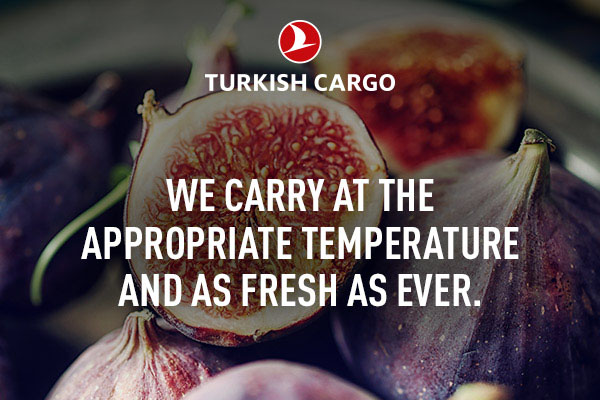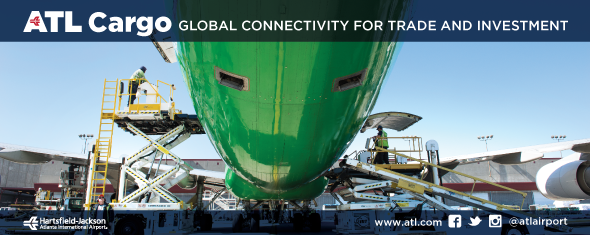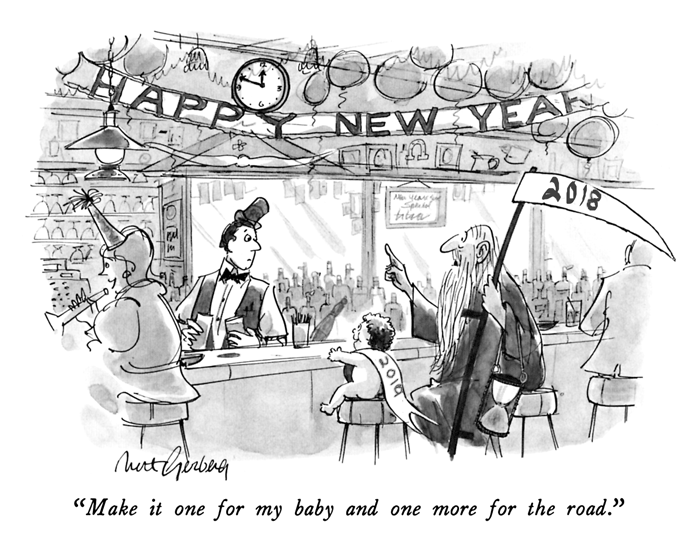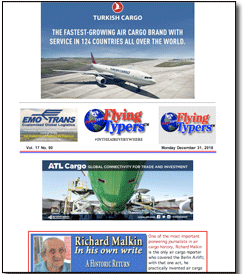 |
The festive vox pop by FlyingTypers found air freight stalwarts
in good form and, reasonably positive about the industry in 2019.
But obstacles to growth are also on the horizon.
 Sebastiaan
Scholte, CEO of Jan de Rijk Logistic and chairman of The International
Air Cargo Association (TIACA), has been outspoken about the lack of hub
capacity for all-cargo operations at European airports during 2018, but
he believes the challenges of 2019 will lie elsewhere. Sebastiaan
Scholte, CEO of Jan de Rijk Logistic and chairman of The International
Air Cargo Association (TIACA), has been outspoken about the lack of hub
capacity for all-cargo operations at European airports during 2018, but
he believes the challenges of 2019 will lie elsewhere.
“I am cautiously optimistic about
2019,” he told FlyingTypers. “Growth will be less
than 2018, but there still will be growth, especially driven by e-commerce
growth.
“The impact of eventual trade war/barriers
is still hard to determine, just like we still do not know what the effects
of Brexit will be.
“Labor shortages, mainly in U.S. and
Europe will persist, which could have an effect on capacity - especially
on ground, in terms of handling and trucking.”
 Brandon
Fried, Executive Director at The Airforwarders Association, is hoping
that market demand next year will surpass both 2018 and 2017. But he admits
that the headwinds in macro-economic terms could be strong. Brandon
Fried, Executive Director at The Airforwarders Association, is hoping
that market demand next year will surpass both 2018 and 2017. But he admits
that the headwinds in macro-economic terms could be strong.
“While we are hoping for robust air
cargo growth in 2019, the current economic and supply demand environment
may cause the beginning of a modest slowdown,” he said. “Inflation
could rise, the dollar is getting stronger, the Euro is weaker, Brexit
uncertainty looms and, of course, the tenuous oil situation created by
the Iran sanctions and the U.S. tariff situation could play significant
roles in reducing air cargo demand.
“Also, volumes driven by e-commerce
- Amazon, Alibaba etc. - could create capacity constraints and raise costs.”
The macro-economic forecasts for Eurozone
growth have also been slowing in recent months and this could weigh heavily
on consumer demand next year. Freight Investor Services’ China-Europe
Forward Curve predicts a long descent in air freight pricing on the lane
through the first quarter of 2019 after a reasonable peak season at the
end of 2018.
 Harriet
Heathcote, Airfreight Business Development Manager at FIS, told FlyingTypers
from her London office that the industry in general was struggling with
“huge overcapacity” at the moment and “it looks like
forwarders are going to be left with an excess of block space agreement
space”. Harriet
Heathcote, Airfreight Business Development Manager at FIS, told FlyingTypers
from her London office that the industry in general was struggling with
“huge overcapacity” at the moment and “it looks like
forwarders are going to be left with an excess of block space agreement
space”.
She added: “We’re thinking next
year, it’s probably going to take everybody a while to find their
feet and actually work out where the market will be. We think it will
be quite volatile and it might not do what it’s supposed to, year-on-year.”
Freight marketplace Freightos reported in
mid-December that, excluding China-Europe, there wasn’t a peak season
for air freight rates in 2018. “In fact, Europe-U.S. rates are currently
only 3% - with some carriers still posting promotion rates - up on November
5. Over the same period, China-U.S. rates actually fell by 4%.
This was in stark contrast with mid-December
2017, when many routes hit capacity, leaving many shippers facing sky-high
rates to get their shipment loaded. Freightos noted that airlines have
increased capacity since last year, but also that demand has not increased
as much as anticipated during 2018.
 As
for next year, Manel Galindo, CEO of Freightos WebCargo, told FlyingTypers
that current indicators suggested that air cargo demand would increase
next year. As
for next year, Manel Galindo, CEO of Freightos WebCargo, told FlyingTypers
that current indicators suggested that air cargo demand would increase
next year.
“For instance, the latest WTO outlook
for global trade predicts modest growth, which should also play out as
a modest growth in demand for air freight,” he said. “And,
having been caught last year, air cargo carriers have been increasing
capacity. However, forecasts can be blown apart by unexpected factors,
such as this year’s sudden escalation of the U.S.-China trade war.”
Overcoming the headwinds facing the industry
next year will be aided by the new tools becoming available for air freight
stakeholders. “Fortunately, technology can help us work more efficiently,
especially through big data, digitization/robotization and AI,”
said Scholte.
SkyKing
 |
|







